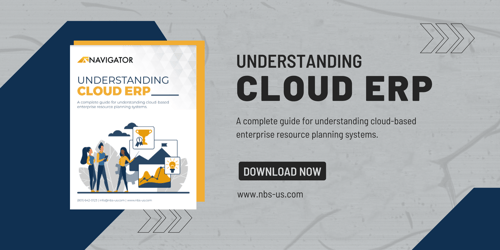
Bring Complete Visibility to the Finance Team
Finance departments are finding themselves under an increasing amount of pressure both from regulators and from within the business itself. Firms must be nimble, profitable, and financially precise.
This is tricky for the finance department. But cloud ERP for finance executives can help by bringing complete visibility to the finance department for faster, more accurate financial management even in the face of these headwinds.
That’s because cloud ERP brings real-time, unified financial data to your company and increases accounting transparency across the organization. This can facilitate faster closes, lower transaction costs, and working capital optimization, in addition to ensuring compliance needs are met nationally and globally.
All areas of a business improve with the help of a modern cloud-based ERP system, but the finance department might be the biggest winner.
Accountants and finance benefit from modern cloud ERP solutions - learn how in this video.
How Finance Wins Big with Modern ERP
Here’s why.
1. Centralized Data for a Complete Picture
Cloud-based ERP houses all of a firm’s data end-to-end, serving as the nerve center for a business. This greatly helps with financial visibility, because it automatically brings together all financial data in one place for easy reporting and analysis.
With a single repository for all financial data, reporting consistency and reliability are improved for legal, segment, and management reporting. Central management and real-time access to all bank-related information and accounts make it easy to conduct liquidity forecasts and manage cash and liquidity, as well as optimize cash positions.
2. Real-Time Access
ERP systems connect all business processes within a company, linking together processes across the entire value chain. This means that manufacturing, procurement, sales, and service are all automatically updated to the general ledger and sub-ledgers for faster and more complete insight.
Since all financial data is recorded automatically and stored in the cloud, the finance department also gains real-time data access from a cloud-based ERP system. This greater visibility helps shorten cash cycles and improve the cash-to-carry cycle.
Real-time access to collections, disbursement, and other financial activities also helps with cash flow management and optimization.
3. Better Audit Trails
Financial auditing is much easier when businesses use a modern cloud-based ERP solution. ERP systems automatically generate a transparent audit trail, including drill-down functions for top-level aggregated figures, detailed sub-ledger postings, original data for a given business process, and changes to data. Auditing is significantly easier with a cloud-based ERP system.
Role-based system access also tracks and limits what data is accessible for a given employee, limiting fraud and security issues.
4. Notifications
Visibility is further improved with automated system notifications that facilitate approval and financial transparency. Payment and dunning proposals can be sent automatically to accountants for acceptance or manual resolution for more efficient financial oversight with cloud-based ERP systems, for instance, and financial exceptions can trigger notifications to key stakeholders.
Streamlined collections and dunning from robust notification also improve transparency for exact amounts owed, length of time outstanding, and from whom. This can help achieve shorter days-sales-outstanding (DSO) and reduce operating cash cycles.
5. Improved Forecasting
Better visibility into the future also comes with having a cloud ERP system in place.
By having all company information in one place, it is easier to run analytics systems against company data and project out with tools such as artificial intelligence neural networks. Management accounting simulations and what-if analysis also combine with real-time financial information for better decision-making.
The range of forecasting and projections is significantly improved as a result of having all data within a company linked and in one place online.
6. Added Financial Metrics
Cloud-based ERP systems are built for financial visibility, so an additional benefit of these systems is having more financial metrics easily available. A range of financial metrics that either takes time to prepare or normally is beyond the means of the finance department becomes available when a cloud-based ERP system is in place.
Some of these metrics include:
- Cost of compliance from FTEs and third parties such as consultants and auditors
- Cost of non-compliance such as penalties and additional resources demanded
- Cost of finance as a percent of revenue
- Number of violation notices from regulatory agencies
- Turnover of finance department staff
- Timeliness of internal and external reporting
- Closing-cycle times
- Manual entries and non-integrated spreadsheets
- Days sales outstanding (DSO)
And the list goes on.
It's Time to Ditch the Spreadsheets
For finance departments that are still relying on spreadsheets and reports from various departments within a company, the added visibility from a cloud-based ERP system is a game-changer. But even for firms that already are using financial management software or an on-premise ERP system, the visibility from an integrated, cloud-based ERP system can be eye-opening.
The silos within a company have been broken down with cloud-based ERP, and this is a significant event for finance departments that rely on visibility for making optimal financial decisions and properly managing the financial picture of a business.
Everyone wins from a properly implemented ERP system. The finance department might gain the most, though.
To learn more about the ERP journey, check out our free guide, Understanding Cloud ERP.


